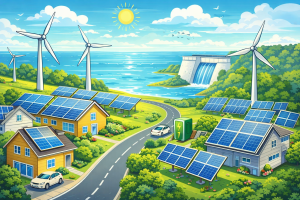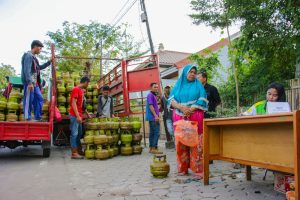Jakarta – The energy policy organisation Transisi Bersih is advocating for the implementation of a coal export tax as a fiscal solution to fund the energy transition independently. Executive Director of Transisi Bersih, Abdurrahman Arum, stated on Wednesday, 25 June, that Indonesia could finance its energy transformation in a logical and strategic manner.
The impetus comes from limited public funding and unfulfilled pledges of international funding, such as under the Just Energy Transition Partnership (JETP) scheme. “Instead of continuing to rely on foreign funds, we can divert some of the profits from coal exports to domestic clean energy investments,” Arum said.
She added that this approach also indirectly places the burden of transition on industrialised countries, which have contributed the most carbon emissions.
In a summary paper titled “National Coal Export Tax: Building Funding Independence for Indonesia’s Energy Transition,” Clean Transition simulates two coal export tax schemes that are flexible and do not burden the domestic market. The first scheme is based on the rupiah to dollar exchange rate; the second scheme is based on the global price of coal.
With tariffs ranging from 5 to 11 per cent, the potential state revenue is estimated to be between USD 700 million and more than USD 5 billion per year from 2022 to 2024, and could even be greater starting in 2025.
“Global demand for coal is highly inelastic, at only 0.008. This means that a 10 per cent increase in price only reduces consumption by 0.08 per cent,” explained Clean Transition senior researcher Muhammar Irfan.
This allows miners in Indonesia to charge export taxes to overseas buyers without significantly disrupting export volumes. As the world’s largest coal exporter, with more than a third of global supply, Indonesia is strategically positioned to regulate global market prices through appropriate fiscal policy.
“This export tax is not just a matter of revenue, but a geopolitical tool and transformation,” said Harryadin Mahardika, Director of the Clean Transition Programme.
Additional revenue through production levies
A similar idea also came from the Indonesian Sustainable Welfare Foundation (SUSTAIN). They consider that in addition to export taxes, coal production levies with progressive rates can be a significant source of funding.
According to SUSTAIN Executive Director Tata Mustasya, based on data from 2022 to 2024 and various price scenarios, additional state revenue from production levies could range from IDR 84.5 trillion to IDR 353.7 trillion per year (equivalent to USD 5.63 billion to USD 23.58 billion).
“The coal industry is still enjoying super-normal profits. If this levy is implemented, we can finance the development of transmission and renewable energy plants without burdening the state budget or the public,” Tata said.
He added that this scheme not only strengthens the country’s fiscal policy but also disincentivises coal production. That way, national energy investment can shift more quickly to the renewable sector, paving the way for the green energy market to run optimally before 2030. (Hartatik)
Banner photo: Image generated by OpenAI’s DALL·E via ChatGPT (2024)















